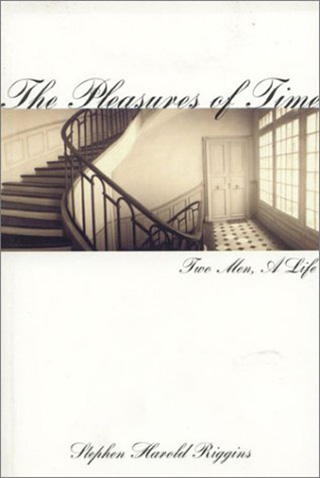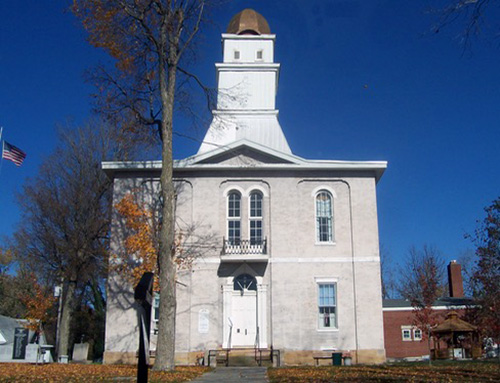 The Pleasures of Time:
The Pleasures of Time:
Two Men, A Life
by Stephen Harold Riggins
Published by Insomniac Press
Published April 25, 2003
History (biography/memoir)
320 pgs. • Find on Amazon.com
Reviewed by Stephen O. Murray
May 13, 2003
The reader of The Pleasures of Time eventually learns that it is based on a journal that author Stephen Riggins began in 1972, when he was a graduate student in sociology at the University of Toronto.
Initially, the journal focused entirely on recording the remarks of Riggins’s lover, Paul Bouissac, a professor of French at the University of Toronto who had been a circus barker in France, ran a small circus in Canada, and analyzed the semiotics of traditional European circuses. Bouissac had been a protégé of the structuralist anthropologist Claude Lévi-Strauss and published an enigmatically avant-garde novel, Les Demoiselles, with the prestigious French publisher Editions de Minuit (1970).
There is a lot about circus performers and performances in The Pleasures of Time, which, like the journal on which it is based, begins as something resembling a biography of Bouissac. The early parts of the book explore Bouissac’s early years getting a Catholic education in the years around the time of World War II, in the south of France. (Bouissac was born in Perigueux in 1934. His background was working-class and he was regarded as a provincial when he began study in Paris.)
Not even the early parts of the book are chronological. Having completed reading the whole book, I don’t have even a tentative explanation about the ordering of vignettes, though there are clumps of them with shared topics. Many stand on their own. Some are very brief records of memorable expressions, only some of which are quips. (My favorite remark derived from someone else: “I’m not the person who put the snow on the sidewalk. I’m not going to be the one who takes it away.”)
There are word portraits of some other interesting people, some famous (Allan Bloom, John Cage, Michel Foucault), many not, some eccentric, some not very eccentric. Eventually, one learns more about the author’s dissertation research (on the making of reputations and careers of 19th-century French composers having earlier tried to analyze innovation among 20th-century English composers), the psychopathology of the dissertation writer, the small southern Indiana town in which he grew up, and some of the sarcasm about his aspirations to play Boswell from a Samuel Johnson unenthusiastic about being the subject of a book and in having what he says recorded and analyzed.[1]There is also extensive analysis of a second novel, titled The Strip-Tease of Madame Bovary, that was never published, that seems close to Nabokov and Borges territory. My guess is that the book does … Continue reading
The tales of trying to run a circus in Canada are hilarious, even to someone with no interest in circuses (either the three-ring American extravaganzas or the smaller and sometimes artistic French ones). Early on, Riggins records Bouissac’s explanation for the latter’s fascination with the circus, which, “for many people is just a synonym for vulgarity and excess. He responded that when he was a child, the circus had embodied a parallel universe, [with] everything denied a little child in a small provincial town in France.” This account helps the reader, though s/he may still think there is too much about circuses and researching circus performances herein.
Riggins is a good observer and writes very well about what he observed. Once I relaxed my expectations of linearity and of anything resembling a chronological narrative or any explanation of how a relationship in which the partners are geographically separated two-thirds of the time survives, I enjoyed the pieces.
Some definitely fit together, but there are no transitions between sections and the jarringness of some of the juxtapositions is undoubtedly intentional. Bouissac was something of a fabricator of “the new novel” and later started teaching a course on surrealists. Although there is no mention of OULIPO[2]OULIPO is the Workshop of Potential Literature (Ouvroir de Littérature Potentielle), a group of writers and mathematicians –Ed. or of any of the writers I recognize as belonging to that “school” (e.g., Raymond Queneau, Marcel Duchamp, Marcel Bénabou, Harry Mathews), the assumption that disparate materials can be juxtaposed with each explored in detail seems closely akin to OULIPO even more than to the surrealists between the world wars.

I would have liked some retrospective comment on the very interesting 1982 interview of Michel Foucault that is included in the book. I’d also have been interested in more about North American semiotics organizing (particularly at Indiana University, where Thomas Sebeok build a program that did not outlast him very long). Even more idiosyncratically (because it is the department in which I did my own doctoral work), I’d have been interested in more about the sociology department of the University of Toronto (Riggins does not even name the supervisor of his dissertation), a very large one in which we overlapped (though I do not recall encountering Riggins; Paul Bouissac was the “internal external examiner” at the farce of my dissertation defense and probably helped explain my dissertation to the very ad hoc committee of sociologists who I had mistakenly assumed had read it after I had been sent out…)
I particularly enjoyed the pointillistic portraits that emerges of Riggins’s “surrogate grandmother” back in Indiana, and the juggler Christian in Paris, the more straightforward portrait of his piano teacher, the incisive analyses of Allan Bloom (which goes into the accuracy of his transformation into Ravelstein), the late music of Gabriel Fauré, and of the French style of being open about having a lover of the same-sex but not being defined by a politicized gay identity in the North American manner (corroborating Edmund White’s account in The Flaneur).
There are sections I skimmed through, but although I had not intended to read the book this past weekend, I couldn’t put it down until I had reached the end.
Riggins is currently Professor Emeritus of Sociology at Memorial University of Newfoundland.
first published by epinions, 13 May 2003
©2003, 2017, Stephen O. Murray

